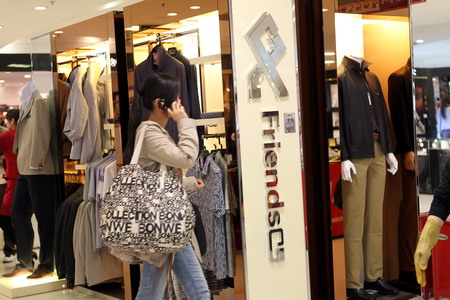Companies
Top brands fail to pass quality test
Updated: 2011-04-20 10:08
By Cui Jia and Wang Yan (China Daily)
|
 |
|
 |
|
Top: A customer selects clothes at a Zara store in Xidan shopping area. Above: A customer passes a store of Friends, another brand name that failed the quality inspection. [Photo / China Daily] |
The fashion retailer admitted to China Daily that the pair of inspected trousers had less cotton content than labeled. It was the company's first official response to questions of quality in China.
"Our quality teams are analyzing the garment to figure out exactly how the problem occurred," said Ray Hsu, who is listed on the Zara website as a media contact person in China. "Our standards are very high, as we must comply with the most demanding laws worldwide in all our more than 800 million units' production," she said by email.
She did not answer a question about whether the inspected trousers are sold worldwide or only on the Chinese market.
In early 2007, Shanghai authorities exposed questionable clothing quality in nearly a dozen top luxury brands, including Chanel, Armani, Christian Dior and Burberry. Samples from Zara were also declared substandard.
"I just love Zara's style, which domestic brands just cannot beat. I don't really care about its fabric content, which I couldn't tell anyway," university student Huang Shuang, 21, said while browsing at a buzzing Zara store in Beijing's Xidan commercial district during the weekend.
"I cannot believe such a big brand could have so many quality issues," said Luo Qi, 32, who works for a foreign accounting company and frequently travels to Europe. "I won't stop buying Zara clothes, but I think they owe Chinese consumers an apology. I often find that the quality of the clothes I buy in Europe is much better than those in China, even though they are from the same brand."
Dong from BCA said Chinese consumers are obsessed with foreign brands. "Many people still believe the quality of foreign brands is almost certainly better than domestic brands. Actually," he said, "some Chinese brands care more about product quality than those well-known brands because they can't lure consumers to buy their products just by their brand names."
Some don't bother
"The number of complaints about foreign-brand products has been on the rise in recent years, especially among clothes and electronic products," Zhang Lerong, chief editor of the complaint channel at online.sh.cn, told China Daily for a story about World Consumer Rights Day on March 15.
"When we help complainants solve their problems, we often feel the global companies are reluctant to be contacted by the media."
Wang Fengchang, CEO of the legal website Laweach and a Beijing-based expert in consumers' rights protection, said he has seen few large-scale complaints related to clothes, but it is not because the industry enjoys high quality standards.
"Now that market competition is getting fiercer, many manufacturers have turned to price wars. In order to reduce production costs, they might use cheap and low-quality materials," Wang said. "We have received scattered complaints on clothes, but they are more about obvious flaws, such as ragged appearances and faded colors.
"As for hidden problems, such as incorrect labels, they are hard for the consumers to find out." He said that inspection fees are too high and "not worth it" for an individual consumer. More assertive action by government watchdogs might prevent such problems, he said.
He also attributed the largely passive attitudes about inspection results to people's ignorance of their rights as consumers.
"Many consumers may not want to bother with the so-called 'small money' they spent on the products. They might just swallow the anger and carry on," he said.
"It is not exclusive to the clothing industry. It is more obvious in some other fields, such as electronic products."
Specials

In the swim
Out of every 10 swimsuits in the world, seven are made in China.

Big spenders
Travelers spend more on shopping than food, hotels, other expenses

Rise in super rich
Rising property prices and a fast-growing economy have been the key drivers.



